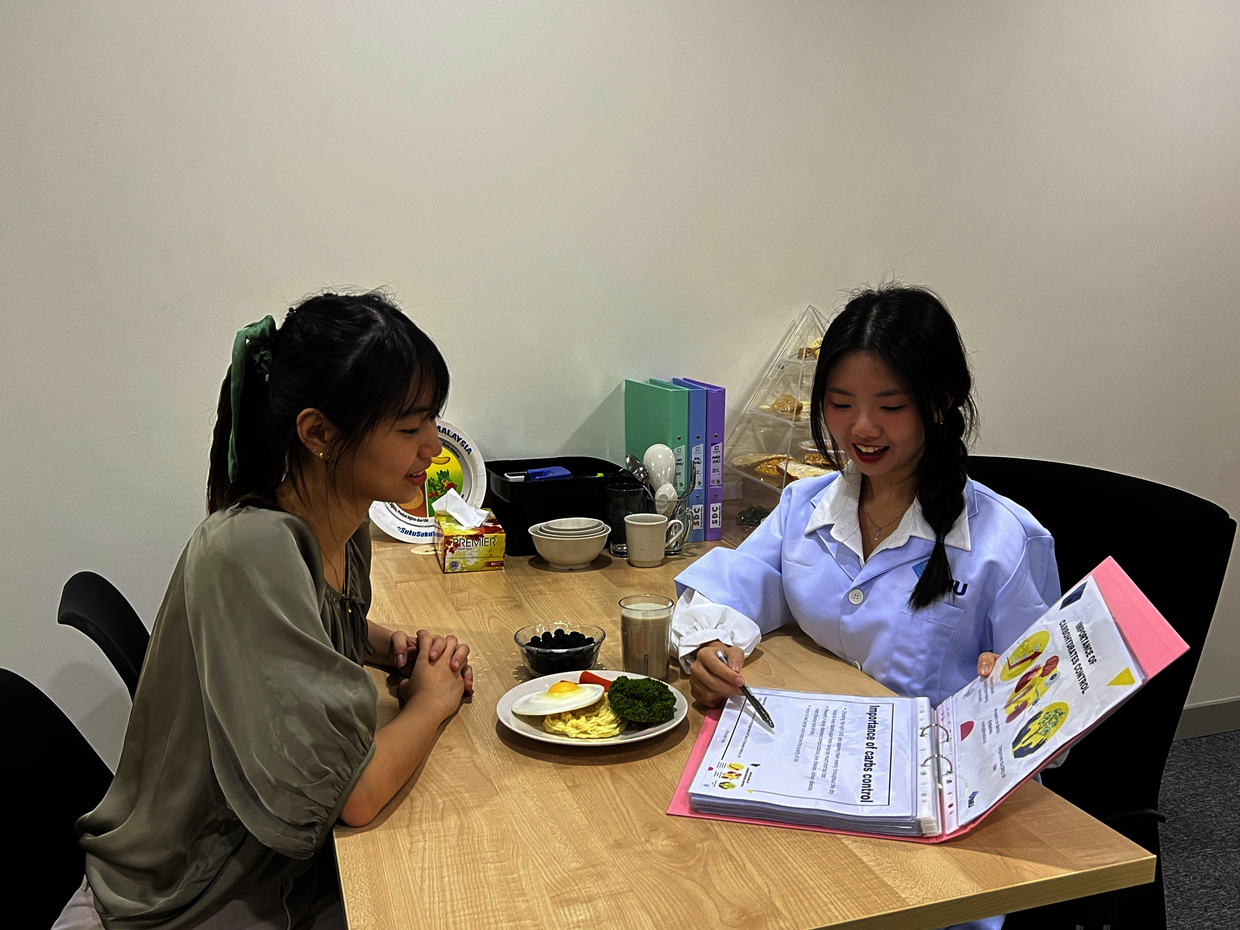Group effort: Lee (front row, third from left), Yap and Prof Chee (third row, fifth and sixth from right, respectively) with the pioneer and current teams at the SDC.
AS non-communicable diseases (NCDs) such as diabetes and heart disease continue to be a concern in Malaysia, there is a need to promote the importance of lifestyle and dietary changes for better health among Malaysians.
That, coupled with the need to increase the visibility of the roles of dietitians, was the inspiration behind the recent launch of the International Medical University (IMU) Student-Led Dietetics Clinic (SDC), said its pro vice-chancellor (Academic) Prof Dr Winnie Chee Siew Swee.
The country’s inaugural student-led dietetics clinic is run by the varsity’s final year students of the Bachelor of Science (Hons) Dietetics with Nutrition programme, with the services being offered free of charge. Addressing the nation’s nutritional deficits, the clinic, launched on Sept 19, provides public access to evidence-based dietary consultations for chronic diseases such as obesity, diabetes, kidney failure and cancer, especially targeting lower socioeconomic groups.
SDC former project leader Yap Zi Qian, who recently graduated from the varsity, said the abundance of misleading nutrition information on social media, which exacerbates the confusion surrounding proper dietary choices, was another factor leading to the initiative.
“Food plays a fundamental role in our lives. By understanding how to enjoy our meals while also preventing or even combating diseases, we can significantly enhance our well-being,” she told StarEdu.
“Not only does the clinic provide free individual dietary consultations, it also offers group counselling and advanced nutrition screening using bioelectrical impedance analysis (BIA) to analyse the body,” she shared. BIA is the latest technology that is used to assess the body composition of patients, such as body fat, muscle mass and hydration status.
While the conceptualisation of the clinic was done by the Nutrition and Dietetics Faculty, the student dietitians collaborated in planning the clinic’s operational structure, managing its finances, sourcing for equipment and furniture, marketing its services and monitoring quality.
During day-to-day operations, student dietitians are responsible for assessing the patients’ nutrition status, diagnosing their nutritional issues, and resolving nutrition problems through individualised meal plans and oral nutrition supplement recommendations.
The students also use behaviour strategies to motivate patients to adhere to a healthier lifestyle.
Present to supervise and offer guidance are registered dietitians from the faculty.
Incumbent SDC project leader Evon Lee said most of the decision-making falls on the student dietitians, who “have to outline everything as how a registered dietician would”.
“At times we are nervous to see the patients but our supervisors are there to guide us on our assessment skills and counselling techniques.
“After that, we have consolidation sessions with our supervisors to identify the gaps to be addressed and obtain feedback for future improvements.
“We appreciate that there are patients who trust us and are willing to provide us with learning opportunities,” she said.
Yap, who has been actively following the progress of her juniors, added that the clinic is essential in providing student dietitians with opportunities to hone effective communication skills.
“Exposure to the clinic’s operations gave me a glimpse into the business side of healthcare, which could prove invaluable if I decide to embark on an entrepreneurial path in the future,” she added.
Prof Chee expressed her hope that the clinic will go on to offer services for children and provide online telehealth consultation services.
“We also hope to collaborate with non-governmental organisations and long-term care facilities serving underprivileged communities to provide nutritional care advice to ensure an improved nutritional status of the Malaysian community,” she said.
Open from 10am to 4pm, from Monday to Thursday, the clinic’s services are primarily in-person and only available when semesters are ongoing.
Registration for individual diet consultations can be done online via the QR code posted on the “IMU Student Dietetics Clinic” Facebook page and the @Imu-sdc Dietetics Instagram page. Appointments for next year are open for booking.
A doctor’s referral letter, together with other medical records such as blood test results and medication prescriptions, is preferred to help the dietitians understand the patients’ medical conditions better and provide the right nutrition management.
Li Lian, 18, a student in Kuala Lumpur, is a participant of the BRATs Young Journalist Programme run by The Star’s Newspaper-in-Education (Star-NiE) team.
To join Star-NiE’s online youth community, go to facebook.com/niebrats.
Now that you have read the article, test your understanding by carrying out the following English language activities.
1 What are your favourite foods? How about foods that you dislike? List them down. When you are done, group the items into “Healthy foods” and “Unhealthy foods”. How many of your favourite foods are healthy? What can you conclude about your food preferences?
2 If a dietitian were to examine the list of foods you like and dislike, what do you think he or she would say? Role-play the dialogue, with your friend taking on the role of the dietitian.
The Star’s Newspaper-in-Education (Star-NiE) programme promotes the use of English language in primary and secondary schools nationwide.
For Star-NiE enquiries, email starnie@thestar.com.my.







